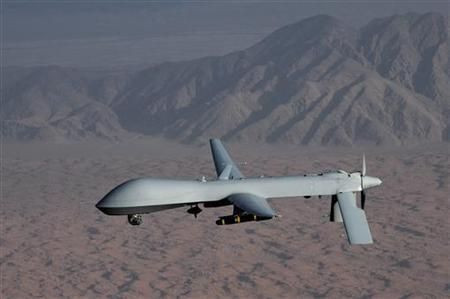Djibouti Government Forces US Drones To Leave Airport After Tense Summer For American Troops At Camp Lemonnier

Safety concerns have shuttered one of the United States' most important -- and most secretive -- bases for drone operations, forcing the American military to move its fleet of unmanned craft away from the international airport in the tiny desert country of Djibouti.
Djibouti, whose capital city goes by the same name, is an arid country of just 8,880 square miles (23,000 square kilometers) tucked between Ethiopia, Eritrea and Somalia. Its port lies at the nexus of the Red Sea and the Gulf of Aden, along one of the world's busiest shipping routes. And, since 2002, the U.S. military has made Camp Lemonnier "the primary base of operations for U.S. Africa Command in the Horn of Africa."
It is the central hub for surveillance drones and armed drone operations into Yemen, where al Qaeda in the Arabian Peninsula is based; and Somalia, home to the al-Shabab, whose fighters perpetrated the gruesome massacre in Nairobi, Kenya, this weekend.
There are about 4,000 U.S. troops, contractors and personnel at Camp Lemonnier, which was first established as a colonial outpost by the French Foreign Legion and is situated next to the Djibouti-Ambouli International Airport, at the edge of the capital city.
But, for the Djiboutian government, that proximity has become a problem.
At least five drones based in Djibouti have crashed since January 2011, which is around the time the U.S. military began drastically ramping up its drone program in Djibouti. By last year, unmanned vehicles were taking off from Camp Lemonnier several times a day, and at least eight Predator drones, capable of firing missiles, were based there.
But, with Djibouti growing increasingly concerned about drone crashes that could harm civilians or crash into commercial aircraft (no drone accidents have caused fatalities in Djibouti yet, but at least one crashed near a residential neighborhood) the government there has forced the Pentagon to move its drone operations farther afield.
The U.S. drone program is no stranger to controversy.
It was a Djibouti-based drone that took the life of al Qaeda operative and American citizen Anwar al-Awlaki, who was an born in the U.S. and studied there before returning to Yemen, and whose teenage son also died in the strike. That particular drone mission has been criticized perhaps more than any other, raising concerns about the legality of unmanned strikes against suspected militants.
But the situation on the ground in Djibouti shows that drone warfare -- along with the infrastructure, security and secrecy required to sustain it -- can also be objectionable to friendly host countries.
The relationship between Djiboutian nationals and the U.S. military grew especially tense this summer, after the military contractor KBR, Inc. (NYSE:KBR) took over base-support services under a contract worth $35 million -- less than half the cost of the old contract. In order to deliver those savings, KBR pursued cost-cutting measures that included cutting its support staff from about 1,000 workers - mostly Djiboutian citizens -- down to 600. In response, the remaining 600 staffers went on strike, leaving troops to pitch in on camp upkeep wherever possible.
Though the strike has been resolved, it hurt the relationship between the U.S. military and the Djiboutians, notwithstanding the military's ongoing hearts-and-minds outreach projects in the capital city.
According to the Washington Post, the Horn of Africa drone program is now operating from a makeshift airstrip in the country's arid hinterlands, called Chabelley Airfield. It took a seven-month scramble -- and $13 million -- for the military to make the transition complete.
It is unclear how long this situation will persist, or whether the U.S. will have to find another hub for drone surveillance and warfare in the Horn of Africa. If so, it would be a major setback; the Department of Defense was making plans last year to bulk up the base with up to $1.4 billion in investments over the next few years.
In addition, the U.S. has been looking to extend its drone operations to more bases all around the world -- but this snafu in Djibouti does not bode well for those efforts.
© Copyright IBTimes 2024. All rights reserved.






















